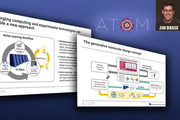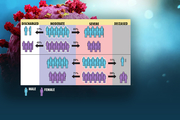Did you know we have a monthly newsletter? View past volumes and subscribe.
Panel discussion spotlights COVID-19 R&D
July 19, 2022 -
The DSI’s career panel series continued on June 28 to highlight some of LLNL’s COVID-19 research projects. Three data scientists—Emilia Grzesiak, Derek Jones, and Priyadip Ray—joined moderator and data scientist Stewart He to talk about their work in drug screening, protein–drug compounds, antibody–antigen sequence analysis, and risk factor identification.
He, who earned a PhD in Computer...
UC Merced students work with LLNL mentors on potential new drugs to combat COVID-19
June 30, 2022 -
Students from the University of California, Merced worked with mentors at LLNL to identify drug compounds that could be used to treat COVID-19 during a two-week Data Science Challenge (DSC) that concluded on June 6. For the first time in the DSC series since the COVID-19 pandemic began in 2020, Lab mentors visited the college campus to provide in-person guidance for five teams of UC Merced...
LLNL’s Brase discusses advances by ATOM in accelerating drug discovery pipeline
June 7, 2022 -
The private-public Accelerating Therapeutic Opportunities in Medicine (ATOM) consortium is showing “significant” progress in demonstrating that HPC and M) tools can speed up the drug discovery process, said Jim Brase, ATOM co-lead and LLNL’s deputy associate director for data science. The consortium currently boasts more than a dozen member organizations, including national laboratories...
CASC team wins best paper at visualization symposium
May 25, 2022 -
A research team from LLNL’s Center for Applied Scientific Computing won Best Paper at the 15th IEEE Pacific Visualization Symposium (PacificVis), which was held virtually on April 11–14. Computer scientists Harsh Bhatia, Peer-Timo Bremer, and Peter Lindstrom collaborated with University of Utah colleagues Duong Hoang, Nate Morrical, and Valerio Pascucci on “AMM: Adaptive Multilinear Meshes.”...
Kevin McLoughlin applies computational biology to complex problems
May 17, 2022 -
Kevin McLoughlin has always been fascinated by the intersection of computing and biology. His LLNL career encompasses award-winning microbial detection technology, a COVID-19 antiviral drug design pipeline, and work with the ATOM consortium. The appeal for him in these projects lies at the intersection of computing and biology. “I love finding ways to visualize data that reveal relationships...
Machine learning model finds COVID-19 risks for cancer patients
March 10, 2022 -
A new study by researchers at LLNL and the University of California, San Francisco, looks to identify cancer-related risks for poor outcomes from COVID-19. Analyzing one of the largest databases of patients with cancer and COVID-19, the team found previously unreported links between a rare type of cancer—as well as two cancer treatment-related drugs—and an increased risk of hospitalization...
LLNL team models COVID-19 disease progression and identifies risk factors
Feb. 15, 2022 -
An LLNL team has developed a comprehensive dynamic model of COVID-19 disease progression in hospitalized patients, finding that risk factors for complications from the disease are dependent on the patient’s disease state. Using a machine learning algorithm on a dataset of electronic health records from more than 1,300 hospitalized COVID-19 patients with ProMedica — the largest health care...
Building confidence in materials modeling using statistics
Oct. 31, 2021 -
LLNL statisticians, computational modelers, and materials scientists have been developing a statistical framework for researchers to better assess the relationship between model uncertainties and experimental data. The Livermore-developed statistical framework is intended to assess sources of uncertainty in strength model input, recommend new experiments to reduce those sources of uncertainty...
LLNL joins Human Vaccines Project to accelerate vaccine development and understanding of immune response
Oct. 21, 2021 -
LLNL has joined the international Human Vaccines Project (HVP), bringing Lab expertise and computing resources to the consortium to aid development of a universal coronavirus vaccine and improve understanding of immune response. The HVP is a nonprofit, public-private partnership with a mission to decode the human immune system and accelerate the development of vaccines and immunotherapies...
Tackling the COVID-19 pandemic
Oct. 11, 2021 -
To help the U.S. fight the COVID-19 pandemic, LLNL did what it does best: quickly bring together interdisciplinary teams and diverse technologies to address urgent national challenges. This effort includes applying advanced high-performance computing resources to biological research and anayzing complicated computer models and enormous datasets. Read more in Science & Technology Review.
Visualization software stands the test of time
Sept. 13, 2021 -
In the decades since LLNL’s founding, the technology used in pursuit of the Laboratory’s national security mission has changed over time. For example, studying scientific phenomena and predicting their behaviors require increasingly robust, high-resolution simulations. These crucial tasks compound the demands on high-performance computing hardware and software, which must continually be...
COVID-19 detection and analysis with Nisha Mulakken (VIDEO)
June 7, 2021 -
LLNL biostatistician Nisha Mulakken has enhanced the Lawrence Livermore Microbial Detection Array (LLMDA) system with detection capability for all variants of SARS-CoV-2. The technology detects a broad range of organisms—viruses, bacteria, archaea, protozoa, and fungi—and has demonstrated novel species identification for human health, animal health, biodefense, and environmental sampling...
Laser-driven ion acceleration with deep learning
May 25, 2021 -
While advances in machine learning over the past decade have made significant impacts in applications such as image classification, natural language processing and pattern recognition, scientific endeavors have only just begun to leverage this technology. This is most notable in processing large quantities of data from experiments. Research conducted at LLNL is the first to apply neural...
The data-driven future of extreme physics
May 19, 2021 -
By applying modern machine learning and data science methods to “extreme” plasma physics, researchers can gain insight into our universe and find clues about creating a limitless amount of energy. In a recent perspective published in Nature, LLNL scientists and international collaborators outline key challenges and future directions in using machine learning and other data-driven techniques...
COVID-19 HPC Consortium reflects on past year
April 1, 2021 -
COVID-19 HPC Consortium scientists and stakeholders met virtually on March 23 to mark the consortium’s one-year anniversary, discussing the progress of research projects and the need to pursue a broader organization to mobilize supercomputing access for future crises. The White House announced the launch of the public-private consortium, which provides COVID-19 researchers with free access to...
CASC research in machine learning robustness debuts at AAAI conference
Feb. 10, 2021 -
LLNL’s Center for Applied Scientific Computing (CASC) has steadily grown its reputation in the artificial intelligence (AI)/machine learning (ML) community—a trend continued by three papers accepted at the 35th AAAI Conference on Artificial Intelligence, held virtually on February 2–9, 2021. Computer scientists Jayaraman Thiagarajan, Rushil Anirudh, Bhavya Kailkhura, and Peer-Timo Bremer led...
Model for COVID-19 drug discovery a Gordon Bell finalist
Nov. 17, 2020 -
A machine learning model developed by a team of LLNL scientists to aid in COVID-19 drug discovery efforts is a finalist for the Gordon Bell Special Prize for High Performance Computing-Based COVID-19 Research. Using Sierra, the world’s third fastest supercomputer, LLNL scientists produced a more accurate and efficient generative model to enable COVID-19 researchers to produce novel compounds...
DOE announces five new energy projects at LLNL
Nov. 13, 2020 -
The DOE today announced two rounds of awards for the High Performance Computing for Energy Innovation Program HPC4EI), including five projects at LLNL. HPC4EI connects industry with the computational resources and expertise of the DOE national laboratories to solve challenges in manufacturing, accelerate discovery and adoption of new materials and improve energy efficiency. The awards were...
What put LLNL at the center of U.S. supercomputing in 2020?
Nov. 12, 2020 -
The HPC world is waiting for the next series of transitions to far larger machines with exascale capabilities. By this time next year, the bi-annual ranking of the Top500 most powerful systems will be refreshed at the top as Frontier, El Capitan, Aurora, and other DOE systems come online. While LLNL was already planning around AI acceleration for its cognitive simulation aims and had a number...
AI gets a boost via LLNL, SambaNova collaboration
Oct. 20, 2020 -
LLNL has installed a state-of-the-art artificial intelligence (AI) accelerator from SambaNova Systems, the National Nuclear Security Administration (NNSA) announced today, allowing researchers to more effectively combine AI and machine learning (ML) with complex scientific workloads. LLNL has begun integrating the new AI hardware, SambaNova Systems DataScale™, into the NNSA’s Corona...























